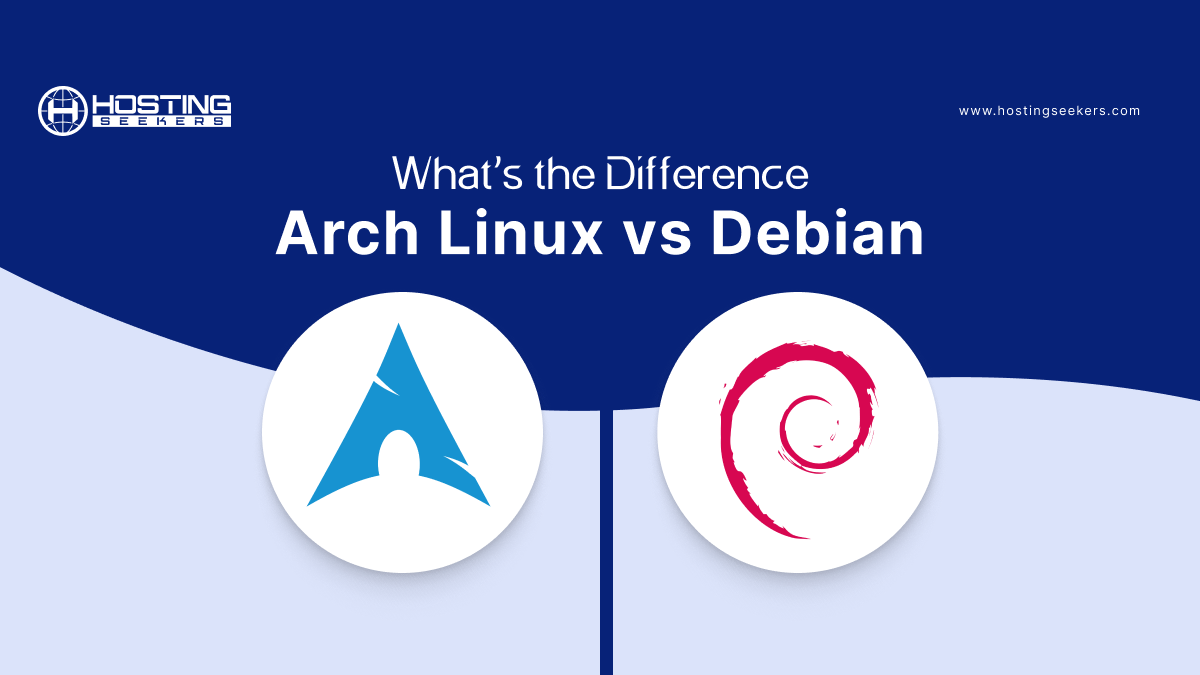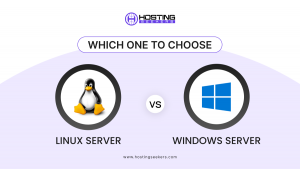
Arch Linux vs Debian: What’s the Difference?
Comparison Updated on : December 31, 2025Linux is used by 57.8% of all websites. But when it comes to Linux distributions, developers often find themselves choosing between flexibility and stability. (Source: W3techs )
Among the countless options, Arch Linux and Debian stand out as two of the most influential and widely used distros. Both offer powerful environments for coding, testing, and deployment, but they follow very different philosophies.
For developers, the choice isn’t just about which distro looks better on paper; it’s about how the system aligns with their workflow. Do you prefer a bleeding-edge, customizable environment where you control every detail like Arch Linux, or a time-tested system that emphasizes reliability and stability like Debian? In this guide, we will explore the detailed comparison of Arch Linux vs Debian, depending on its features, pros & cons, and much more.
Understanding Arch Linux
Arch Linux stands out as one of the most distinctive Linux distributions, crafted especially for advanced users who value control, simplicity, and complete customization.
Unlike beginner-friendly distros that arrive pre-configured, Arch delivers a clean and minimal base system, giving users the freedom to build their environment exactly the way they envision.
This philosophy demands a strong understanding of Linux internals but rewards users with unmatched flexibility. First introduced on March 11, 2002, with version 0.1, Arch quickly gained recognition as a technically sophisticated distribution.
Its do-it-yourself (DIY) nature makes it a preferred choice for developers, system administrators, and Linux enthusiasts who enjoy tailoring every detail of their setup.
Beyond customization, Arch thrives on the strength of its vibrant community, which continuously contributes tools, documentation, and support, making it more than just an OS but a culture of shared knowledge and innovation.
Who Should Use Arch Linux?
1. Experienced and Advanced Users
Arch Linux is best suited for users with a robust understanding of Linux who are comfortable with command-line tools, manual setup, and system personalization. It’s a perfect choice for those who need complete customization over their operating system.
2. Cutting-Edge Software Enthusiast
With its rolling release model, Arch provides the latest software updates and kernel versions as soon as they are available. Users who love staying on the bleeding edge of technology will find Arch an ideal match.
3. Flexibility Seekers
Arch Linux offers a minimal base system, free from unnecessary software, enabling users to customize their environment extensively. It’s tailored for individuals who prefer building their system from scratch, shaping it precisely to their workflow and preferences.
Arch Linux Recent Released Versions
| Versions | Date |
| 6.16.4 | Sept 1, 2025 |
| 6.15.8 | Aug 1, 2025 |
| 6.15.4 | July 1, 2025 |
Pros and Cons of Arch Linux
| Pros | Cons |
| Easy features and updates. | Steep learning curve. |
| Customization capability. | Time-consuming setup. |
| Robust software options. | Potential stability issues. |
| A bare essential and unique experience. | Lack of official support. |
Understanding Debian
Debian is one of the oldest and most influential Linux distributions, first introduced by Ian Murdock in August 1992. As a pioneer in the open-source world, it has laid the groundwork for many well-known Linux-based systems, including Ubuntu, Linux Mint, and Kali Linux.
Debian is used by 7.5% of all websites that use Linux. (Source: W3techs) What sets Debian apart is its unwavering focus on stability, security, and reliability. Its strict release cycle and rigorous testing process ensure that every package is thoroughly vetted before it reaches users. This makes Debian the go-to choice for servers, mission-critical environments, and individuals who value dependability over cutting-edge features.
Thanks to its rock-solid architecture and long-standing reputation, Debian continues to be a cornerstone of the Linux ecosystem, powering everything from enterprise servers to community-driven projects across the globe.
Who Uses Debian?
1. Server Administrators
Debian’s unmatched stability and long-term support make it a good choice for servers. System administrators prefer it for hosting applications, websites, and enterprise-level workloads where reliability is non-negotiable.
2. Security-focused users
With its strict package testing and strong commitment to security patches, Debian is ideal for users who prioritize a secure environment over the latest flashy features.
3. Stability Seekers
Debian is perfect for individuals and businesses who value consistency, if you prefer a rock-solid system that “just works” with minimal disruptions.
4. Developers and IT Professionals
As most popular distributions, such as Kali Linux and Ubuntu, are based on Debian, developers often choose it to work closely with the source, ensuring compatibility and access to a vast software ecosystem.
Debian Recent Released Versions
| Versions | Date |
| 13.1 | Sept 6, 2025 |
| 12.12 | Sept 6, 2025 |
| Debian 13 trixie | Aug 9, 2025 |
Pros and Cons of Debian
| Pros | Cons |
| Robust security features</span | Complex installation |
| Active community | Update delays |
| Wide hardware support | Conservative release cycle |
Arch Linux vs Debian: Key Difference
| Feature | Arch Linux | Debian |
| Release Model | Launched in 2002 | Launched in 1992 |
| Customization | Maximum flexibility, build everything from scratch. | Moderate customization, but conservative defaults. |
| Ease of Use | Difficult, not beginner-friendly, requires strong Linux knowledge. | Intermediate – easier than Arch, but less beginner-friendly than Ubuntu. |
| Package Manager | Pacman | APT |
| AUR (Arch User Repo) | Yes, AUR provides huge access to community-maintained software. | No |
| Pre-installed Software | Minimal, barebones install, user adds everything. | Minimal base install, optional software available |
| System Stability | Moderate rolling updates may cause breakage | Extremely stable, well-tested packages |
| Update Frequency | Commonplace daily or weekly updates | Less frequent stable branch every 2–3 years |
| Default Desktop Env. | None – user chooses (KDE, GNOME, XFCE, etc.) | GNOME by default, but it can be changed. |
| Software Availability | Extensive official repos + AUR for extra software | Large, stable, and testing repositories |
| Installation Complexity | Complex – manual setup required | Intermediate, guided, but with more steps than Ubuntu |
| Security Features | Good, but requires manual configuration | Strong prioritizes security and reliability |
| Ideal For | Advanced users, developers, customization enthusiasts | Intermediate users, servers, and stability seekers |
| Community Support | Strong, but requires troubleshooting skills | Large, reliable, and beginner-friendly |
| Rolling Back Updates | Complex, manual intervention required | Moderate, stable branch provides a safe fallback |
Arch Linux vs Debian: Customization
- Arch Linux: Offers maximum flexibility. It starts with a minimal base system, allowing users to build everything from scratch, including a desktop environment, software, and system configurations. Ideal for those who want a fully personalized OS.
- Debian: Provides moderate customization. At the same time, you can tweak desktop environments and software; Debian defaults to a more conservative and pre-tested setup to ensure stability rather than extreme personalization.
Arch Linux vs Debian: Installation
- Arch Linux: Installation is entirely manual. Users must configure disk partitions, networking, package installation, and system settings themselves. This offers learning opportunities, but it is time-consuming and complex.
- Debian: Offers a guided installer (text or graphical) that simplifies the process. While not as beginner-friendly as Ubuntu, Debian’s installation is much smoother and more structured than Arch’s.
Arch Linux vs Debian: Ease of Use
- Arch Linux: Designed for experienced users. There are no shortcuts, so understanding Linux commands, configurations, and system management is essential. Beginners may find it overwhelming.
- Debian: Easier to use compared to Arch. Its stable environment and pre-configured defaults make it manageable for intermediate users and IT professionals, though it’s not as beginner-friendly as Ubuntu.
Arch Linux vs Debian: Package Management
Arch Linux: Uses pacman as its package manager, known for speed and efficiency. Arch also benefits from the AUR (Arch User Repository), which provides community-maintained packages, vastly expanding software availability.
Debian: Uses APT (Advanced Package Tool), one of the most reliable and beginner-friendly package managers. It prioritizes stability and security over the availability of cutting-edge software.
Arch Linux vs Debian: Conclusion
Both Arch Linux and Debian stand out as powerful Linux distributions, but they serve different audiences and use cases. Debian is the go-to choice for stability, security, and long-term support, perfect for servers, enterprises, and users who want a dependable system with minimal maintenance. On the other hand, Arch Linux is designed for advanced users who value customization, cutting-edge software, and complete control over their environment.
Frequently Asked Questions
Q 1. Which is better, Arch Linux or Debian?
Ans. It depends on your needs. Arch is better for customization and robust software, while Debian is better for stability and reliability.
Q 2. Is Arch Linux more complicated to use than Debian?
Ans. Yes. Arch Linux requires manual setup and more profound Linux knowledge, while Debian offers easier installation and pre-configured environments.
Q 3. Which is more stable: Arch or Debian?
Ans. Debian is generally more stable, making it suitable for servers and production environments.
Q 4. Do Arch and Debian use different package managers?
Ans. Yes. Arch uses pacman, while Debian uses APT (Advanced Package Tool).
Q 5. Which has more up-to-date software: Arch or Debian?
Ans. Arch Linux follows a rolling release model, so it always has the latest software. Debian prioritizes stability, so updates are slower.
Q 6. Can beginners use Arch Linux?
Ans. Beginners can use Arch, but it’s not recommended unless they’re willing to learn and troubleshoot. Debian is more beginner-friendly.
Q 7. Which is better for servers: Arch Linux or Debian?
Ans. Debian is generally considered better for servers because of its stability, long-term support, and security-focused updates. Arch Linux, while flexible and cutting-edge, requires more maintenance and is better suited for advanced users or specialized environments rather than production servers.
Q 8. Which is more beginner-friendly, Arch Linux or Debian?
Ans. Debian is more user-friendly, especially for beginners, as it offers a stable system, easy installation, and plenty of pre-configured packages. Arch Linux, on the other hand, is aimed at advanced users who prefer to build their system from scratch, which can be challenging for newcomers but rewarding for experienced users.




